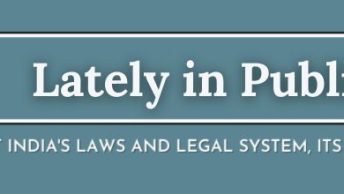A fortnightly feature inspired by I-CONnect’s weekly “What’s New in Public Law” feature that addresses the lacuna of a one-stop-shop public law newsletter in the Indian legal space.
What’s new at LAOT
1. Saumya Ranjan Dixit, Re-Visiting Simpliciter Termination: Protecting the Legitimate Expectation of Probationers,(argues that the distinction between simpliciter and punitive termination of a probationer without granting any reasonable opportunity of hearing before termination for the former lacks a reasonable basis)
2. Rahul Bajaj and Dr.Sanjay Jain, Evaluating the Electoral Bonds Judgment: A Welcome Development For Indian Democracy That Leaves Some Questions Unanswered, (dwell into some of the nuances of the electoral bond judgement to further the debate on its implications)
3. Aditya Panugnati, The New Telecom Act: What’s the Fuss? (examines the newly enacted Telecommunications Act and delves into the concerns and uncertainties surrounding its provisions)
4. Rahul Bajaj and Dr.Sanjay Jain, Interpreting the Article 370 Judgment: A Plea for Nuance,(analyze the efforts of the court to crystallize the principles for the exercise of the President’s powers to declare President’s rule under Article 356 of the Constitution repays in Article 370 Case)
5. Kanishk Srinivas, Analysing ADR v. UoI: A Case for Conjunctive Double Proportionality ( argues that the double proportionality standard, unlike the proportionality standard, must be read as a conjunctive test to prevent wholesale rejection of every impugned plenary legislation)
6. Alok Kumar Prasanna,Introduction to the Book Discussion on Mathew John’s India’s Communal Constitution: Law, Religion and the Making of a People (discusses Mathew John’s new book The Communal Constitution with the help of contemporary examples)
Journals
1. A Saravanan, Law and Policy Framework Governing Wastewater (Reuse) Management in India, Statute Law Review (examines the constitutional provisions, laws, policies, rules, regulations and judicial interventions on wastewater management and identifies key challenges in implementing and enforcing wastewater laws and byelaws in India).
2. Saumya Uma, Contextualizing Law and Policy Framework on Mental Health, Chapter from Mental Health Care Resource Book, Springer (discusses the components of mental health as a human right and the international standards on this subject, critiques the current legal and policy framework of mental health in India, and identifies the gaps to be addressed in the future).
3. Ahmed Memon, ‘English in taste, Indian in blood’: caste hegemony in the making of British international legal thought, London Review of International Law (argues that case as a central actor in the development of British international legal thought, and it further entrenched the caste hegemony into the broader racial hierarchy in international law in the 19th century).
4. Sonam Singh & Manish Kumar, An Investigation on the Use of Electronic Resources by Faculty and Research Scholars of National Law Universities of North India, VEETHIKA- An International Interdisciplinary Research Journal (examines the prevalence of electronic resources for legal information across National Law Universities in North India and highlights the need to maintain a set of guidelines to encourage the use of such resources).
5. Anurag Bhaskar, The Foresighted Ambedkar, Penguin (Anuraag Bhaskar analyses the role of Ambedkar as the only person to have been involved at all stages on the drafting of the Indian constitutional document since 1919).
Blogs:
1. Chiranth Mukunda, The Supreme Court’s Electoral Bonds Judgment – III: A Critique of Double Proportionality, Indian Constitutional Law and Philosophy.
2. Gautam Bhatia, The Unexamined Law: On the Supreme Court’s Stay Order in the Election Commissioners Case, Indian Constitutional Law and Philosophy.
3. Abhinav Sekhri, Jail is not the Rule – Contesting Restrictive Bail Regimes, The Proof of Guilt Blog (also see Part II and Part III).
4. Sukriti, Digiyatra & the Defect in the Idea of ‘Consent’, The Centre for Communication Governance Blog.
5. Kartik Kalra, Privileges Constrained: On the Indian Supreme Court’s Rejection of Bribery as Parliamentary Privilege, Verfassungsblog.
Podcasts:
1. Jayna Kothari, Rosalie Abella, Helen Mountfield KC and Sandra Fredman, RightsUp Podcast! Discrimination Law (Part 1), Centre for Law and Policy Research (discussing Fredman’s monograph ‘Discrimination Law’, which analyses the strengths and weaknesses of legal responses to complex social problems of inequality and develops an analytic framework of substantive equality).
2. Anupam Manur and Shrikrishna Upadhyaya, SC Push to Fix Price Caps for Hospitals is a Bad Idea, All Things Policy (breaking down the distortionary implications of the Supreme Court’s order to impose price caps for hospital services).
3. Mohsin Alam Bhat and Milan Vaishnav, The Citizenship Amendment Act’s Next Chapter, Grand Tamasha (examining the origins of the CAA, its constitutionality, and the fine print of the CAA rules, alongside the prospects of an all-India NRC exercise).
4. Aparna Chandra and Shruti Rajagopalan, Aparna Chandra Puts the Supreme Court on Trial, Ideas of India (deliberating upon the problem of pendency across Indian courts, whether the Supreme Court is truly a people’s court, the problem of special leave petitions, and potential ways to reform the judiciary).
5. Apurva Vishwanath, Manoj CG and Niharika Nanda, Revisiting the Women’s Reservation Bill and the delay in its rollout, 3 Things (analysing the content and implementation strategy of the Women’s Reservation Bill).
6. Sharad Raghavan, Apoorva Mandhani and Shekhar Gupta, What Electoral Bonds data reveals, Cut the Clutter by The Print (understanding what the electoral bonds data reveals, and what it fails to disclose).
Opportunities and the other things ➖
1. IDIA-ICUL Essay Writing Competition by NLU, Jodhpur.The last date for submission is 20 April,2024.
2. Call for Papers by Journal for Maharashtra National Law University Aurangabad (JMNLUA). The last date for submission is 25 April 2024.
3. Call for Papers by RGNUL Financial and Mercantile Law Review. The last date to submit is 28 April 2024.
4. Alternative Judgment Writing Competition on Disability Rights 2024 by NLSIU, Bengaluru. The last date to submit is 15 May 2024.
5. Call for Papers by DNLU Journal of Legal Studies. The last date to submit is 15 May 2024.
This newsletter is created by Eeshan Sonak, Aditi Bhojnagarwala, Jeetendra Vishwakarma, and Saranya Ravindran from the Law and Other Things Student Team with the guidance of Surbhi Karwa and Gaurav Mukherjee.




